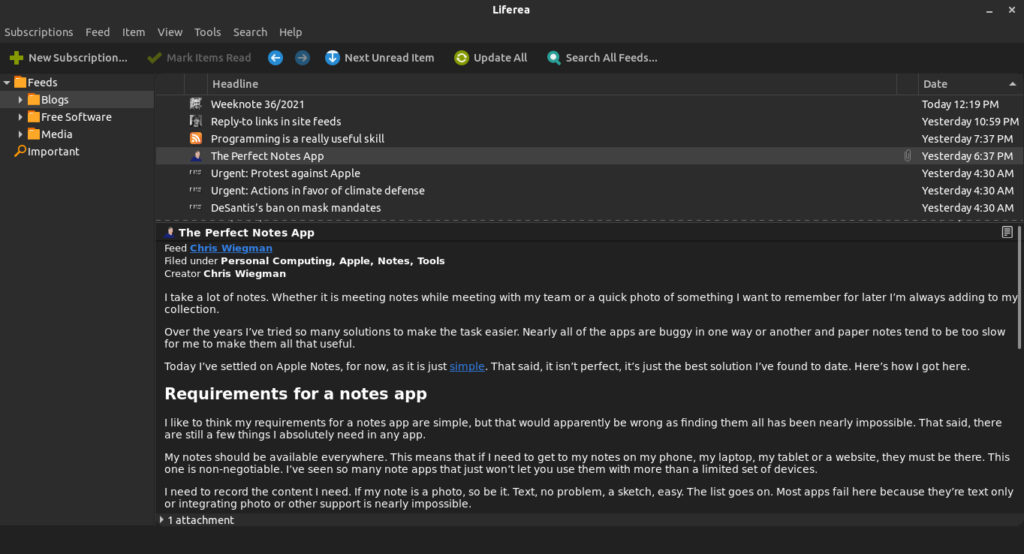I always encourage people to use RSS or Atom feeds to subscribe to people’s blogs but many people need an introduction and explanation about RSS and Atom.
Let’s talk about RSS, as it’s not much different with Atom. RSS is basically a web feed that is readable by computers. A web feed is a data format used for providing users with frequently updated content. It means that whenever the blog or news feed gets updated, the user can receive the update in user’s feed aggregator.
Writers or so-called content distributors syndicate a web feed, thereby allowing users to subscribe a channel to it by adding the feed address to a feed aggregator client (also called a feed reader or a news reader).
The information could be blog entries, news headlines, or audio or video files. RSS documents usually contain complete or summarized text, metadata, and author and publishing information.
There are some distinct advantages to using RSS. Instead of visiting the individual websites, RSS feeds can help provide users with updates and information from different sites in one convenient place. For example, instead of visiting 30 websites every day, I just open my feed aggregator and hit the update button, and I get the latest published writings or media from those blogs or news sites I’m subscribed to.
With RSS, subscribing doesn’t need email! You won’t be asked to give away your email address to any blog or site, and that site won’t be able to sell your data to anyone. RSS just simply visits or opens the blog’s RSS file and checks for new writings or media, and will show it to you in a human-readable way.
Just like how you read this blog post on your web browser, but RSS gives you ability to read everything on your own computer without being forced to open my blog.

So what is Atom?
“The Atom Syndication Format is an XML language used for web feeds, while the Atom Publishing Protocol (AtomPub or APP) is a simple HTTP-based protocol for creating and updating web resources.” That was Wikipedia. In human terms, Atom is basically RSS with extra steps.
I personally prefer Atom feeds over RSS ones because Atom benefits from on-going innovation and is a standard. The Atom Syndication Format was published as an IETF proposed standard in RFC 4287 in December 2005, and the Atom Publishing Protocol was published as RFC 5023 two years later, in October 2007.
While the RSS vocabulary has a mechanism to indicate a human language for the feed, there is no way to specify a language for individual items or text elements. Atom, on the other hand, uses the standard xml:lang attribute to make it possible to specify a language context for every piece of human-readable content in the feed.
Also, the Atom working group chose to use timestamps formatted according to the rules specified by RFC 3339 (which is a subset of ISO 8601, my favorite time format).
How to use it really?
Subscribing to blog feeds may be the easiest thing you can do with your computer. First thing you need is a feed aggregator program. I use Liferea, which is a free (libre) program. There are a lot of other programs you can install. Thunderbird and Evolution email clients come with a built-in feed aggregator. If you use Nextcloud, the Nextcloud News app is super cool. Another suggestion is Akregator which is developed by KDE.
Second, you need to go to blogs or news sites you like and grab their RSS or Atom feed URLs. They usually provide their URLs somewhere in their site, possibly using the “subscribe” or similar phrases. An easy way to detect feed URLs is using web browser add-ons. I use Feed Indicator add-on on my Firefox-based browser. You can search similar terms to find more add-ons.
Third, you should copy the link of the RSS or Atom feed and paste it in your feed aggregator program new subscription form, and hit subscribe or OK or whatever it is. You’ll find out.
That’s it. You can now ask your program to update the feeds to get latest published writings or media on your favorite blogs or sites.
